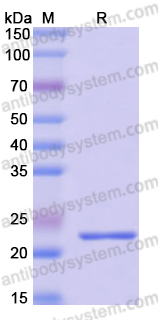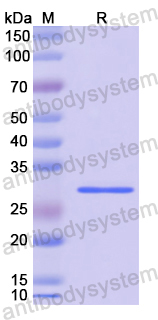Catalog No.
YHD57001
Expression system
E. coli
Species
Homo sapiens (Human)
Protein length
Thr81-Asp268
Predicted molecular weight
23.51 kDa
Nature
Recombinant
Endotoxin level
Please contact with the lab for this information.
Purity
>90% as determined by SDS-PAGE.
Accession
P23378
Applications
ELISA, Immunogen, SDS-PAGE, WB, Bioactivity testing in progress
Form
Lyophilized
Storage buffer
Lyophilized from a solution in PBS pH 7.4, 0.02% NLS, 1mM EDTA, 4% Trehalose, 1% Mannitol.
Reconstitution
Reconstitute in sterile water for a stock solution. A copy of datasheet will be provided with the products, please refer to it for details.
Shipping
In general, proteins are provided as lyophilized powder/frozen liquid. They are shipped out with dry ice/blue ice unless customers require otherwise.
Stability and Storage
Use a manual defrost freezer and avoid repeated freeze thaw cycles. Store at 2 to 8°C for frequent use. Store at -20 to -80°C for twelve months from the date of receipt.
Alternative Names
Glycine decarboxylase, Glycine dehydrogenase (aminomethyl-transferring), Glycine cleavage system P protein, GLDC, Glycine dehydrogenase (decarboxylating), mitochondrial, GCSP
The potential crosstalk genes and molecular mechanisms between systemic lupus erythematosus and periodontitis., PMID:40309038
Genetic aetiologies in relation to response to the ketogenic diet in 226 children with epilepsy., PMID:40290421
Impact of DNA methylation on digestive and metabolic gene expression in red pandas (Ailurus fulgens) during the transition from milk to bamboo diet., PMID:40275147
Comprehensive analysis of metabolism-related gene biomarkers reveals their impact on the diagnosis and prognosis of triple-negative breast cancer., PMID:40217479
Integrated Bioinformatics Analysis Revealing that the NSDHL Gene Might Be Associated with the Progression of Western HFD/SW-Induced Hepatocellular Carcinoma., PMID:40033501
GLDC alleviates cisplatin-induced apoptosis, cellular senescence, and production of reactive oxygen species via regulating UCP1 in the kidney., PMID:40010632
Glycine Decarboxylase Regulates Renal Carcinoma Progression via Interferon Stimulated Gene Factor 3-Mediated Pathway., PMID:39781465
Downregulation of Gldc attenuates myocardial ischemia reperfusion injury in vitro by modulating Akt and NF-κB signalings., PMID:39747134
H3K27 Acetylation-Activated GLDC Accelerated the Advancement of Oral Squamous Cell Carcinoma by Suppressing the p53 Signaling Pathway., PMID:39415627
Case report: Unveiling genetic and phenotypic variability in Nonketotic hyperglycinemia: an atypical early onset case associated with a novel GLRX5 variant., PMID:39323869
Single-nucleus RNA sequencing reveals cell types, genes, and regulatory factors influencing melanogenesis in the breast muscle of Xuefeng black-bone chicken., PMID:39278114
An increased copy number of glycine decarboxylase (GLDC) associated with psychosis reduces extracellular glycine and impairs NMDA receptor function., PMID:39210012
Computational identification of mitochondrial dysfunction biomarkers in severe SARS-CoV-2 infection: Facilitating therapeutic applications of phytomedicine., PMID:38878325
Deep postnatal phenotyping of a new mouse model of nonketotic hyperglycinemia., PMID:38840294
AAV-mediated expression of mouse or human GLDC normalises metabolic biomarkers in a GLDC-deficient mouse model of Non-Ketotic Hyperglycinemia., PMID:38761651
Regulatory role of PDK1 via integrated gene analysis of mitochondria-immune response in periodontitis., PMID:38657876
Deep postnatal phenotyping of a new mouse model of nonketotic hyperglycinemia., PMID:38586005
Sirtuin 5 regulates acute myeloid leukemia cell viability and apoptosis by succinylation modification of glycine decarboxylase., PMID:38585637
Metabolic Rewiring and Altered Glial Differentiation in an iPSC-Derived Astrocyte Model Derived from a Nonketotic Hyperglycinemia Patient., PMID:38474060
Human papillomavirus infection affects treatment outcomes and the immune microenvironment in patients with advanced penile squamous cell carcinoma receiving programmed cell death protein 1 inhibitor-based combination therapy., PMID:38157276
Metabolic Mechanisms Underlying Heat and Drought Tolerance in Lentil Accessions: Implications for Stress Tolerance Breeding., PMID:38068599
Impact of Terminal Heat and Combined Heat-Drought Stress on Plant Growth, Yield, Grain Size, and Nutritional Quality in Chickpea (Cicer arietinum L.)., PMID:37960082
Transcriptome Profiling Based at Different Time Points after Hatching Deepened Our Understanding on Larval Growth and Development of Amphioctopus fangsiao., PMID:37623871
Machine learning methods revealed the roles of immune-metabolism related genes in immune infiltration, stemness, and prognosis of neuroblastoma., PMID:37545226
Identification of glutamyl-prolyl-tRNA synthetase as a new therapeutic target in hepatocellular carcinoma via a novel bioinformatic approach., PMID:37201074
Hypomethylation of glycine dehydrogenase promoter in peripheral blood mononuclear cells is a new diagnostic marker of hepatitis B virus-associated hepatocellular carcinoma., PMID:36878837
Glycine Decarboxylase Suppresses the Renal Cell Carcinoma Growth and Regulates Its Gene Expressions and Functions., PMID:36660213
GLDC mitigated by miR-30e regulates cell proliferation and tumor immune infiltration in TNBC., PMID:36275705
Comparative Transcriptome and Proteome Analysis Provides New Insights Into the Mechanism of Protein Synthesis in Kenaf (Hibiscus cannabinus L.) Leaves., PMID:35800609
Loss of PRMT7 reprograms glycine metabolism to selectively eradicate leukemia stem cells in CML., PMID:35508169
Glycine decarboxylase maintains mitochondrial protein lipoylation to support tumor growth., PMID:35508111
High-Temperature and Drought Stress Effects on Growth, Yield and Nutritional Quality with Transpiration Response to Vapor Pressure Deficit in Lentil., PMID:35009098
The genomic profiling and MAMLD1 expression in human and canines with Cushing's disease., PMID:34517852
Altered skeletal muscle metabolic pathways, age, systemic inflammation, and low cardiorespiratory fitness associate with improvements in disease activity following high-intensity interval training in persons with rheumatoid arthritis., PMID:34246305
mTORC1 activity regulates post-translational modifications of glycine decarboxylase to modulate glycine metabolism and tumorigenesis., PMID:34244482
iTRAQ-based quantitative proteomic analysis reveals the toxic mechanism of diclofenac sodium on the kidney of broiler chicken., PMID:34229076
Genotypic and phenotypic features in Turkish patients with classic nonketotic hyperglycinemia., PMID:33791923
Glycine Cleavage System H Protein Is Essential for Embryonic Viability, Implying Additional Function Beyond the Glycine Cleavage System., PMID:33569080
Phosphatase of regenerating liver-3 regulates cancer cell metabolism in multiple myeloma., PMID:33566385
Obesity increases hepatic glycine dehydrogenase and aminomethyltransferase expression while dietary glycine supplementation reduces white adipose tissue in Zucker diabetic fatty rats., PMID:33057941
Identifying the novel key genes in renal cell carcinoma by bioinformatics analysis and cell experiments., PMID:32699530
Genotype-phenotype correlates of infantile-onset developmental & epileptic encephalopathy syndromes in South India: A single centre experience., PMID:32593896
Large scale analyses of genotype-phenotype relationships of glycine decarboxylase mutations and neurological disease severity., PMID:32421718
Identification of hub genes associated with outcome of clear cell renal cell carcinoma., PMID:32218839
Plasma Formate Is Greater in Fetal and Neonatal Rats Compared with Their Mothers., PMID:31912134
Impaired folate 1-carbon metabolism causes formate-preventable hydrocephalus in glycine decarboxylase-deficient mice., PMID:31794432
Identification of a new GLDC gene alternative splicing variant and its protumorigenic roles in lung cancer., PMID:31773974
Investigating Novel Genes Potentially Involved in Endometrial Adenocarcinoma using Next-Generation Sequencing and Bioinformatic Approaches., PMID:31692912
Glycine cleavage system determines the fate of pluripotent stem cells via the regulation of senescence and epigenetic modifications., PMID:31562192
Host susceptibility to severe influenza A virus infection., PMID:31488196


